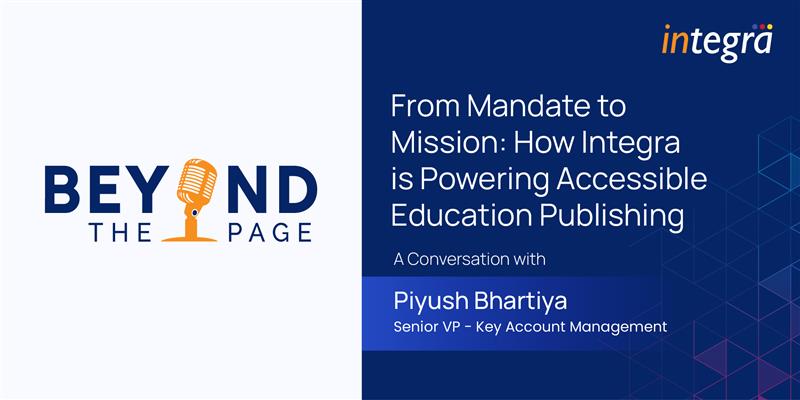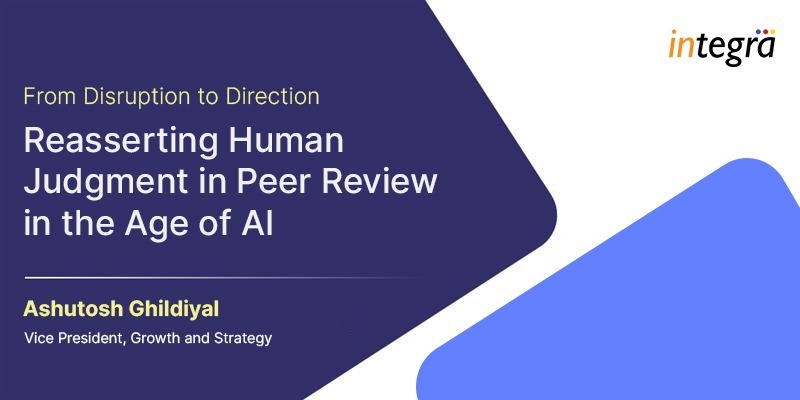From Mandate to Mission: How Integra is Powering Accessible Education Publishing

Welcome to Beyond the Page, where we bring you thought leadership, insights, and stories from the heart of Integra. In this edition, we explore a topic that’s rapidly moving from compliance checklist to strategic imperative: accessibility in education publishing.
With global education shifting rapidly to digital-first models, the call for inclusive, accessible content is louder than ever, fueled in part by the upcoming European Accessibility Act (EAA) and a broader movement toward equity in education.
We sat down with Piyush Bhartiya, Senior Vice President – Key Account Management at Integra, to discuss how accessibility is transforming education publishing, and how Integra is helping its clients go beyond compliance to create content that is inclusive, impactful, and future-ready.
Why Accessibility Matters More Than Ever
Piyush, how do you see accessibility shaping the future of educational publishing?
Piyush: Accessibility is no longer just a regulatory requirement; it’s a moral and strategic priority. Ensuring that all learners, regardless of ability, can access and benefit from educational content is fundamental to the mission of modern publishing.
The EAA, which comes into force in June 2025, is pushing this issue to the forefront. But many of our clients now recognize accessibility as a long-term investment in quality, reach, and reputation.
What does that mean for publishers practically?
Piyush: It means rethinking content workflows and making accessibility a design principle, not an afterthought. Publishers are realizing that accessible content isn’t just for compliance; it improves usability for all learners, enhances discoverability, and enables broader distribution in institutional markets that increasingly prioritize inclusive learning. Whether it’s videos, audios, interactive elements, or assessments, accessibility must be integrated into each content type, ensuring they work across all devices and support various learning contexts. Accessible content doesn’t just benefit users with disabilities; it enhances usability for everyone.
Integra’s Accessibility-First Approach
How is Integra supporting publishers in their accessibility journey?
Piyush: At Integra, we’ve built an accessibility-first approach that encompasses several key areas:
- Born-accessible content development – We embed accessibility principles from the very start of the content creation process.
- Backlist remediation – We make previously published content accessible in line with WCAG and EPUB3 standards.
- Audio and video transcription: We provide transcripts for audio and video content, and we ensure that these are properly synchronized to help learners who depend on assistive technologies.
- Interactive and simulation accessibility: We optimize simulations, quizzes, and other interactive content for keyboard navigation, screen readers, and voice commands, making sure all users can interact with the content seamlessly.
- Expert alt text and image descriptions – Our team of subject matter experts creates alt text and descriptions for complex media elements like images, charts, videos, and animations, ensuring that these descriptions maintain pedagogical value and help students fully engage with the content.
- Document optimization – We handle tagging and structure correction for PDFs, Word files, and digital formats.
- Accessibility audits and consulting – We help clients assess, plan, and prioritize their accessibility efforts.
Our approach treats accessibility as a core quality dimension. It’s embedded into every phase of content production, ensuring that all media elements, from videos to interactive simulations, are designed with accessibility in mind. Our teams are trained to recognize accessibility risks and opportunities across every phase of content production.
AI and Automation: Enablers of Scale and Speed
What role does technology play in meeting accessibility goals at scale?
Piyush: Technology plays a critical enabling role, especially for large-scale content programs where AI and automation help improve both speed and consistency. At Integra, we leverage AI-powered tools for:
- Metadata tagging
- Alt text suggestion generation
- Color contrast and reading order checks
- Language localization for inclusive reach
However, these tools are always used in tandem with human review. Our AI systems are deployed responsibly, aligned with privacy, transparency, and ethical standards, to support human expertise, not replace it.
Going Beyond Compliance
What do you say to publishers who see accessibility as a challenge rather than an opportunity?
Piyush: That mindset is changing rapidly. Increasingly, publishers see accessibility as an opportunity to expand market reach, strengthen brand equity, and create better learning experiences.
Accessible content isn’t just about screen readers, it’s about flexible navigation, multilingual support, readable layouts, and content that works seamlessly across devices and learning contexts.
Moreover, accessible content increases discoverability in digital ecosystems. Search engines can better index and rank content that meets accessibility standards, and institutions that prioritize inclusive learning are more likely to adopt and share such content.
At Integra, we help clients shift from a compliance mindset to an inclusion mindset. That’s where the real impact lies.
The Path Ahead: Strategic Accessibility
How is Integra positioning itself for the future of accessible education?
Piyush: We’re doubling down on accessibility because we believe it’s central to the future of education publishing. That means continuing to invest investing in accessible-first workflows, cutting-edge tools, and skilled talent that can support large-scale accessibility efforts across diverse content types, from videos to interactive assessments.
We also partner with publishers as strategic advisors, helping them plan long-term accessibility strategies that align with their business goals. Whether that’s preparing for the EAA, remediating legacy content, or building accessibility into new digital platforms, we’re here to help every step of the way.
From Mandate to Mission
The shift toward accessibility is more than a regulatory mandate, it’s a mission to make learning more inclusive, equitable, and effective for all. As publishers adapt to the changing landscape of digital education, Integra is proud to be a partner that brings together deep expertise, scalable solutions, and innovative approaches to make education more inclusive, equitable, and effective.
With Piyush and his team leading the charge, Integra is not just helping clients check the compliance box. We’re reshaping how educational content, whether text, video, interactive simulations, or assessments, is imagined, created, and experienced.
From mandate to mission, this is how we make education truly accessible.
Stay tuned to Beyond the Page for more conversations with Integra’s thought leaders as we explore the future of publishing.
Recent Blogs

Why LaTeX Still Matters in Scholarly Publishing—and How the Right Partner Makes All the Difference

Print, Pedagogy, and AI: The New Architecture of Educational Publishing


